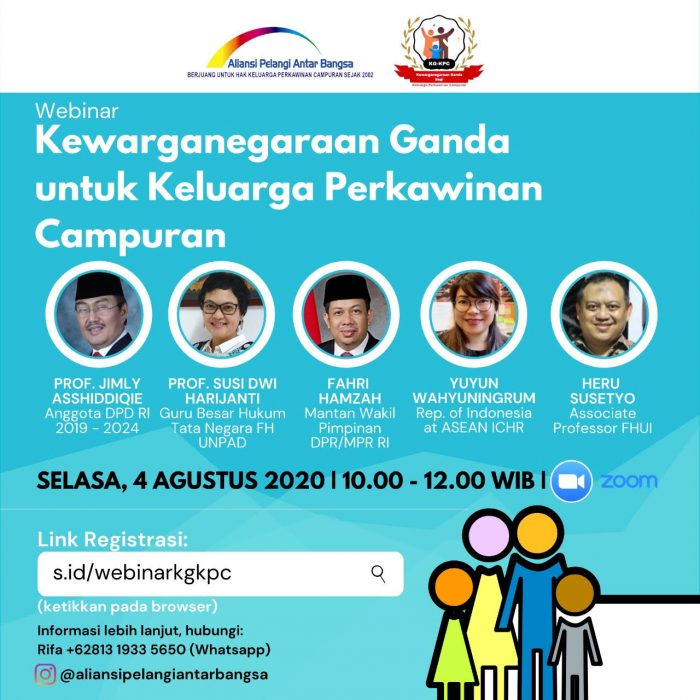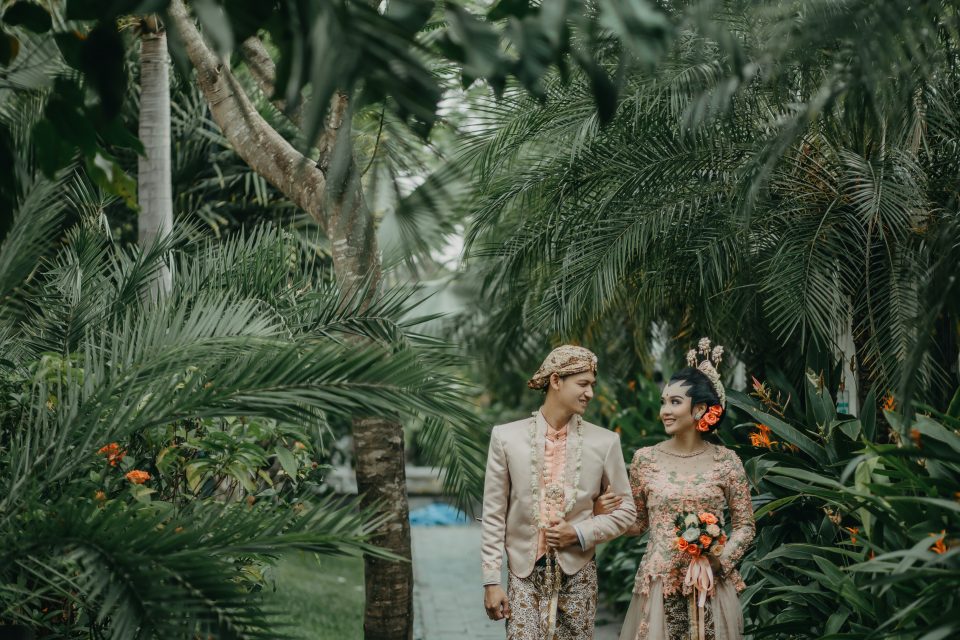A global shift towards greater acceptance of dual citizenship as a result of increased migration, growing overseas diaspora communities, and increased regional integration efforts have been seen in the last 60 years.
Thus, a growing number of Indonesians are married to foreign nationals who decide to stay in Indonesia or live overseas, either permanently or temporarily.
Indonesia’s Citizenship Law and Law No. 6 Year 2011 on Immigration has partly recognised this trend, as demonstrated by the possibility for foreign spouses to obtain permanent residence permits in Indonesia (KITAP) and the granting of limited dual citizenship to children of mixed marriage couples at birth. However, Indonesia’s current legal framework discloses mixed marriage families are still facing considerable hurdles.
Aliansi Pelangi Antar Bangsa (APAB) hosted a webinar on Dual Citizenship for Mixed Marriage Families on Tuesday 4th August as a part of a series of events that APAB is organising to advocate changes in Indonesia’s Law No. 12 Year 2006 on Citizenship, which is currently included in the House of Representatives’ (DPR) 2020-2024 National Legislation Program (Prolegnas) for review.


Speakers at the event included Professor Susi Dwi Harijanti, Constitutional Law at Padjadjaran University; Fahri Hamzah, Former Deputy Chair of Indonesian Parliament; Yuyun Wahyuningrum, Indonesian Representative to the ASEAN Intergovernmental Commission on Human Rights (AICHR); and Heru Susetyo, Associate Professor at the Faculty of Law at the University of Indonesia.
“The lack of equal treatment under Indonesian law has far-reaching implications on the wellbeing of mixed marriage families,” said Nia Schumacher, Chair of APAB. “This is all the more true in the current context of the COVID-19 pandemic, which many mixed marriage families have found themselves separated or face other challenges due to border restrictions and interruption of immigration services in Indonesia and other countries,” she added.
From a human rights perspective, various laws and regulations in Indonesia directly restrict the fulfilment of some of the basic rights of mixed marriage families, including those prescribed in Indonesia’s 1945 Constitution and some of the core international human rights instruments of which Indonesia is a ratifying country.
Equally constraining is the requirement under Article 6 of the Citizenship Law for children of mixed marriage families to choose one nationality after they turn 18. Such requirement restricts children’s rights to maintain their full identity and fails to recognise the potential of bi-nationals to act as bridges between Indonesia and other countries, by contributing their skills and own perspective of the world.
“Humanity must be placed above everything else, and this is consistent with the philosophy of Pancasila. What right do we have to limit the rights of children who know nothing about their mothers and fathers having different nationalities?” pointed out Fahri Hamzah.
Recalling Article 16.3 of the Universal Declaration of Human Rights which recognises the family as a “natural and fundamental group unit of society” entitled “to protection by society and the State”, APAB calls for a revision of Indonesia’s Citizenship Law that would allow children of mixed marriage families, as well as wives and husbands after 10 years of marriage, to acquire lifelong dual citizenship.
Prof. Susi Dwi Harijanti stated, “if dual citizenship is seen as a ‘need or necessity’, several matters must be considered, including the criteria for those who are recognized as having Indonesian citizenship and simultaneously having foreign citizenship.” Whereas Yuyun Wahyuningrum supports efforts to discuss dual nationality because this issue has always been seen sensitive in Indonesia and even in ASEAN.
Furthermore, Heru Susetyo noted that the demand for dual citizenship for mixed marriage families is relevant because it is consistent with the demands of a globalised era as well as the protection of human rights. Moreover, Indonesia will also benefit from the enactment of dual citizenship.
APAB was established in September 2002 and is an association of several mixed marriage organisations, including Srikandi, Komunitas Melati Worldwide (Komet VW), Cross-Cultural Couples Club (C4) and DIANA, as well as individuals who are concerned about the situation of mixed marriage families in Indonesia and abroad. Altogether, APAB represents more than 6,000 members of mixed marriage families who are living in and outside Indonesia.
Over the last two decades, APAB’s advocacy to government ministries, parliament, and other key stakeholders has contributed to greater recognition and protection of the rights of mixed marriage families, particularly in Law No. 12 of 2006 on Citizenship and Law No. 6 of 2011 on Immigration.
For more information, please contact: Nia Schumacher the Chair of APAB to [email protected]




